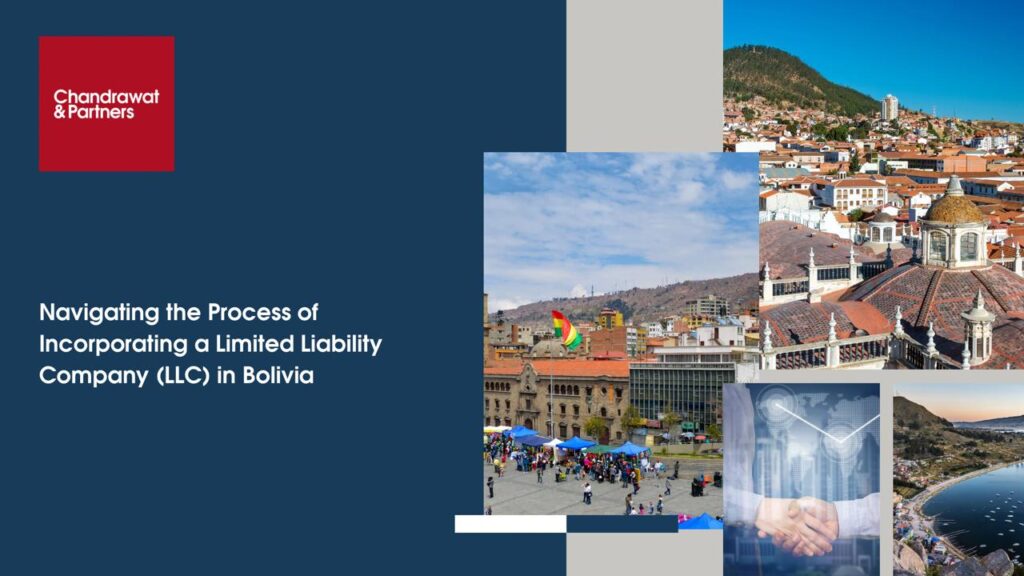
April 07, 2025
Navigating the Process of Incorporating a Limited Liability Company (LLC) in Bolivia
Introduction
Bolivia’s dynamic business landscape presents ample opportunities for entrepreneurs and investors seeking to establish a foothold in South America. The Limited Liability Company (LLC), known locally as “Sociedad de Responsabilidad Limitada” (SRL), stands out as a preferred legal structure for small and medium-sized enterprises (SMEs). This guide delves into the key aspects of incorporating an LLC in Bolivia, providing a thorough understanding of the process, legal requirements, and strategic considerations.
Strategic Advantages of Establishing an LLC in Bolivia
The LLC structure offers a balanced combination of operational flexibility, limited liability protection, and simplified governance, making it particularly attractive for businesses aiming to operate efficiently within Bolivia’s legal framework.
- Limited Liability Protection: Shareholders are liable only up to the extent of their capital contributions, safeguarding personal assets.
- Flexible Management Structure: Unlike corporations, LLCs allow for more adaptable management arrangements.
- Simplified Regulatory Requirements: Compared to larger corporate entities, LLCs face less complex compliance obligations.
Step-by-Step Guide to Incorporating an LLC in Bolivia
- Selecting an Appropriate Company Name
- The name must be distinctive and not conflict with existing registered businesses.
- It must include the phrase “Sociedad de Responsabilidad Limitada” or its abbreviation “SRL” to clearly indicate the company structure.
- Drafting the Articles of Association (Estatutos Sociales)
- This foundational document outlines the company’s business purpose, operational procedures, shareholder rights, and capital distribution.
- It requires signatures from all founding members and must comply with Bolivian corporate law.
- Obtaining a Tax Identification Number (NIT)
- Registration with the Servicio de Impuestos Nacionales (SIN) is mandatory for tax obligations and legal transactions.
- The NIT is a key document for all financial activities, including banking and invoicing.
- Opening a Corporate Bank Account and Depositing Capital
- A corporate bank account must be opened in a Bolivian financial institution.
- Although there is no strict minimum capital requirement, the deposit should reflect the company’s operational capacity.
- Registration with the Public Registry of Commerce (Registro de Comercio)
- Submission of the Articles of Association, NIT, and other relevant documents is required.
- This step officially registers the company, granting it legal recognition and the ability to operate commercially.
- Securing Necessary Licenses and Permits
- Depending on the business sector, specific licenses from municipal, departmental, or national authorities may be necessary.
- Regulatory compliance ensures legal operations and mitigates potential business risks.
Legal Framework and Compliance Obligations
Shareholder Structure and Capital Requirements
- Minimum Shareholders: 2 to 25 members, fostering collaborative management while maintaining flexibility.
- Capital Contributions: No mandatory minimum capital, but contributions should align with the business’s operational scale.
Liability and Governance
- Liability is limited to the extent of capital contributions, providing financial security for shareholders.
- Governance structures can be customized, with directors or managers appointed based on the company’s needs.
Ongoing Corporate Obligations
After incorporation, LLCs must adhere to ongoing legal and regulatory requirements, including:
- Annual Financial Reporting: Submission of financial statements to the relevant authorities.
- Tax Compliance: Regular filings with the SIN, including income tax and VAT returns.
- Registry Updates: Notification of any changes in company structure, directors, or capital to the Registro de Comercio.
Common Challenges in Incorporating an LLC in Bolivia
- Bureaucratic Processes: The registration process can be time-consuming due to administrative procedures.
- Regulatory Complexity: Navigating local laws requires careful attention to detail to avoid compliance issues.
- Language Barriers: Business documents and legal proceedings are conducted in Spanish, necessitating proficiency or professional translation services.
Conclusion: Strategic Considerations for Successful Incorporation
Incorporating an LLC in Bolivia offers a gateway to a growing market with diverse economic opportunities. By understanding the legal framework, strategic advantages, and operational requirements, businesses can establish a strong foundation for long-term success.
While the incorporation process may involve intricate legal and administrative steps, seeking guidance from local legal and financial experts can streamline operations and ensure full compliance with Bolivian regulations.
For more information or queries, please email us at
enquiries@chandrawatpartners.com
Key Contact

Surendra Singh Chandrawat
Managing Partner

